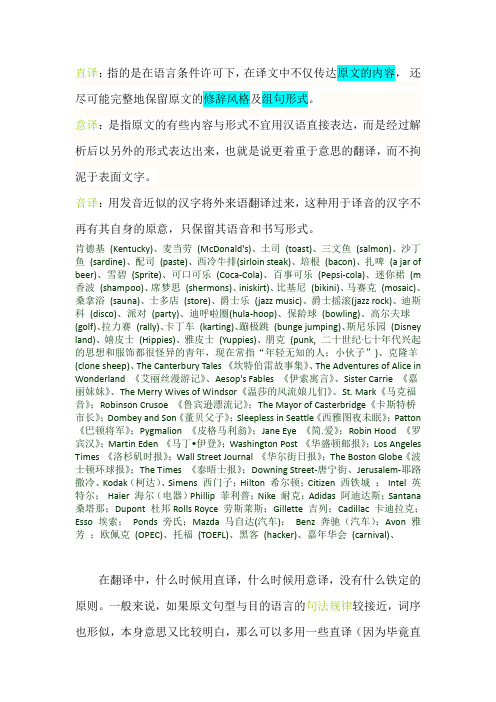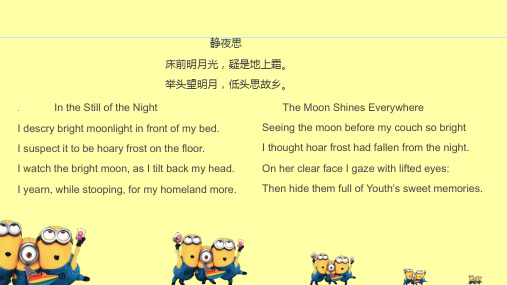直译与意译(例子)
直译与意译补充例子(课件有关内容)

Blood is thicker than water.血浓于水
(2)含义广为流传,读者较为熟悉的短语、习语等,直译可以丰富译语语言。例如:
1) He walked at the head of the funeral procession, and every now and then wiped hiscrocodile tearswith a big handkerchief.
挂羊头,卖狗肉
put back(放回远处,推迟)the clock
开倒车
talk horse
吹牛
kill the goose that lays the golden eggs
杀鸡取卵
drink like a fish
牛饮
Once the wife of a parson(牧师), always the wife of a parson.
4)In wine there is truth.酒后吐真言。
to show one’s cards
摊牌
Shuttle(穿梭,梭子) diplomacy
穿梭外交
a gentleman’s agreement
君子协定
to strike somebody when he is unprepared
攻其不备
to get into every hole
to take advantage of every weakness
五湖四海
five lakes four seas
all corners of the country
We parted the best friends.
死译:我们告别了最好的朋友。
直译、意译(释译)和灵活处理

到没有定型译文可参照的套语,口译时要注意抓住原语的中心意思,结合上下文的意思,采用直译、意译(或称释译)或者灵活处理的办法,译出它的内在含义而不拘泥于其表面文字。
1.直译。
直译套语,表达最为生动,又能符合于原语。
在有可能的情况下,最好用直译,可以保持原语的生动风格。
但是要特别注意译出来必须是不会产生歧义的,否则会适得其反,就不如意译了。
下面几个直译的例子:良药苦口利于病;忠言逆耳利于行。
Good medicine is bitter in the mouth, but good for the disease; good 一intended words offend the ear, but are good for the conduct. 少壮不努力,老大徒伤悲。
If one does not exert oneself in youth, one will regret it in oldâge.远水救不了近火。
Distant water cannot put out a nearby fire.2.意译(释译)。
直译有困难的时候,可以采取意译(释译)。
意译是口译中更常用的方法。
因为当场没有很多时间对语言本身进行推敲琢磨,而且口译要求的是忠于原意,不苛求语言和句型两种语言的对等。
所以除非很有把握才用直译,不然,—般都采用意译。
其实,从广义上来说,口译(oral interprétation)本身就有“意译“的意思。
英语Imerpret译为汉语就是“说明、解释”等的意思。
意译可能会失掉一些文彩,但是为了要保持原意,意译比较稳妥。
下面举几个意译的例子:废除终身制,打破铁饭碗。
Abolish the system of lifelong officiai post and that of state -guaranteed job.鹬蚌相争,渔翁得利。
The third party benefits when two parties fight each other.千里送鹅毛,物轻情意重。
直译与意译例句

Literal translation1.No feast lasts forever.天下没有不散的筵席。
2. He walked at the head of the funeral procession, and every now and then wiped his crocodile tears with a big handkerchief.他走在送葬队伍的前头,还不时用一条大手绢抹去那鳄鱼的眼泪。
3. The Senate Foreign Relations Committee today extended the olive branch to the Clinton Government by pleading for cooperation in developing foreign policy.参议院外交委员会今天向克林顿政府伸出了橄榄枝,要求在发展外交政策上合作。
4. In wine there is truth.酒后吐真言。
5. I'll always remember Thanksgivings as the times we ate good food, sang old-fashioned songs, and shared a lot of love with family and friends.我将永远记得,感恩节是我们吃美食、唱老歌、与家人朋友分享爱的时刻。
6. The sea level is rising little by little in the consequence of global warming.由于全球气候变暖,海平面在一点点地上升。
7. Reforms and the open policy have also emancipated the minds of the people.改革开放也使民族精神获得了解放。
8. The car burns too many gases, and moreover, the price is almost twice as much asI intend to pay.这辆汽车太费油,而且价钱几乎是我想付的两倍。
直译音译意译

直译:指的是在语言条件许可下,在译文中不仅传达原文的内容,还尽可能完整地保留原文的修辞风格及组句形式。
意译:是指原文的有些内容与形式不宜用汉语直接表达,而是经过解析后以另外的形式表达出来,也就是说更着重于意思的翻译,而不拘泥于表面文字。
音译:用发音近似的汉字将外来语翻译过来,这种用于译音的汉字不再有其自身的原意,只保留其语音和书写形式。
肯德基(Kentucky)、麦当劳(McDonald's)、土司(toast)、三文鱼(salmon)、沙丁鱼(sardine)、配司(paste)、西冷牛排(sirloin steak)、培根(bacon)、扎啤(a jar of beer)、雪碧(Sprite)、可口可乐(Coca-Cola)、百事可乐(Pepsi-cola)、迷你裙(m 香波(shampoo)、席梦思(shermons)、iniskirt)、比基尼(bikini)、马赛克(mosaic)、桑拿浴(sauna)、士多店(store)、爵士乐(jazz music)、爵士摇滚(jazz rock)、迪斯科(disco)、派对(party)、迪呼啦圈(hula-hoop)、保龄球(bowling)、高尔夫球(golf)、拉力赛(rally)、卡丁车(karting)、蹦极跳(bunge jumping)、斯尼乐园(Disney land)、嬉皮士(Hippies)、雅皮士(Yuppies)、朋克(punk, 二十世纪七十年代兴起的思想和服饰都很怪异的青年,现在常指“年轻无知的人;小伙子”)、克隆羊(clone sheep)、The Canterbury Tales 《坎特伯雷故事集》、The Adventures of Alice in Wonderland 《艾丽丝漫游记》、Aesop's Fables 《伊索寓言》、Sister Carrie 《嘉丽妹妹》、The Merry Wives of Windsor《温莎的风流娘儿们》、St. Mark《马克福音》;Robinson Crusoe 《鲁宾逊漂流记》;The Mayor of Casterbridge《卡斯特桥市长》;Dombey and Son《董贝父子》;Sleepless in Seattle《西雅图夜未眠》;Patton 《巴顿将军》;Pygmalion 《皮格马利翁》;Jane Eye 《简.爱》;Robin Hood 《罗宾汉》;Martin Eden 《马丁•伊登》;Washington Post 《华盛顿邮报》;Los Angeles Times 《洛杉矶时报》;Wall Street Journal 《华尔街日报》;The Boston Globe《波士顿环球报》;The Times 《泰晤士报》;Downing Street-唐宁街、Jerusalem-耶路撒冷、Kodak(柯达)、Simens 西门子;Hilton 希尔顿;Citizen 西铁城;Intel 英特尔;Haier 海尔(电器)Phillip 菲利普;Nike 耐克;Adidas 阿迪达斯;Santana 桑塔那;Dupont 杜邦Rolls Royce 劳斯莱斯;Gillette 吉列;Cadillac 卡迪拉克;Esso 埃索;Ponds 旁氏;Mazda 马自达(汽车);Benz 奔驰(汽车);Avon 雅芳;欧佩克(OPEC)、托福(TOEFL)、黑客(hacker)、嘉年华会(carnival)、在翻译中,什么时候用直译,什么时候用意译,没有什么铁定的原则。
直译与意译 赏析

【例16】“Why get involved with that pathetic excuse for a human being? His father demanded angrily. 【译文】“为什么要跟那样的下三烂(人渣)混在一起?” 他父亲气 冲冲地问道。 【赏析】“that pathetic excuse for a human being”字面意思是 “可悲的人类的拙劣样品”,但显然不符合汉语表达习惯,意 思十分别扭。翻译为“下三烂”或“人渣”十分传神,可视为 意译佳例。 【例17】The problem is staring us in the face. 【译文】问题明摆着,我们就是想回避也回避不了。 【赏析】本句如照实译为“问题正在盯着我们看”,不仅意思模 糊,而且也没能传递出原文深层含义;译文避开原文基本含义, 将其真实含义饱满传递出来,看似简单,实则不易。
【例3】 My sister goes back to the fat farm again. 【译文】我妹妹又去减肥中心了。 【赏析】有学生望文生义,将这句话译成“我妹妹又去肥胖农场 了。”殊不知fat farm是个俚语说法,意思是“减肥中心”。去 那里的人须要进行大量的体育锻炼,消耗的体力不亚于在农场 干活,而且还要控制饮食,才能取得令人满意的减肥效果,所 以才有此一说。 顺带说一下,英语学习者遇到fat一定要小心,比如:You have a fat chance并不是说你有希望,而是“你没有机会了; 你希望渺茫”。 再如, Fat cats are always showing off their money意思是 “阔老们总喜欢炫耀他们的财富。” 而chew the fat则跟“咀嚼”和“脂肪”也扯不上干系, 它是指 “闲谈”— —几个人聚在一起, 天南地北地东拉西扯。
直译与意译

Ghost
人鬼情未了
严复:在《天演论》译例言里鲜明地提出了“信、达、雅”的翻 译原则和标准。“信”(faithfulness)是指忠实准确地传达原文 的内容;“达”(expressiveness)指译文通顺流畅;“雅” (elegance)可解为译文有文才,文字典雅。
傅雷:重神似而不得形式。他正确地意识到,在文字距离的背后, 实质上是“民族思想方式”的差异。因此翻译要寻找心智相通的
依原文的字面和次第。‘直译’偏重对于原文的忠实,‘意译’偏重译文语气的顺畅。哪一种是最妥 当的译法,人们争执得很厉害。依我看,直译和意译的分别根本不应存在。……想尽量表达原文的意 思,必须尽量保存原文的语句组织。因此直译不能不是意译,而意译也不能不是直译。” 1953年,林汉达在“翻译的原则”一文中写道:“正确的翻译是直译,也就是意译。死译和胡译不 同,呆译和曲译不同,这是可以划分的,它们都是错误的翻译。正确的翻译是分不出直译或意译的。”
1.The snow covers the ground. 大雪覆盖大地 2.The snow clothes the ground. 大地银装素裹
一.含义广为流传, 读者较为熟悉的短语、 习语等,直译可以丰富译语语言。
blind zone Cold War laughing stock pour oil on fire 盲区 冷战 笑柄 火上浇油 四书 五经 丢脸 Four Books Five Classics to lose one’s face
直译和意译(练习)译文
Translation Exercises: (直译和意译)1.You have my sympathy.直译:你有我的同情。
意译:我同情你。
2.Nothing that has been done can not be done better.直译:没有什么已被做过的事情不能被做得更好。
意译:任何事情都有改进的余地。
3.March 1990 found me working in a small constructional firm.直译:1990年发现我在一家小型建筑公司工作。
意译:1990年,我在一家小型建筑公司工作。
4.Words don’t always means what they seem to mean.直译:文字、语言并不总是它表面的含义。
意译:话语常有弦处之音。
5.Partly as a result of the recently increasing demand, wholesale tea prices have almost doubled.部分由于最近日益增长的需求,茶叶的批发价已经几乎翻了一番。
6.I read this letter with both surprise and excitement, surprise because he is still around, excitement because he didn’t ever forget me.我读到他的信时既惊又喜,惊的是他还健在,喜的是他一直没忘记我。
7.They don’t know their right hand from their left.直译:他们分不清这是自己的右手还是左手。
意译:他们什么都不知道。
8.The world won’t end if you don’t pass a test.一次考试不及格,天是不会塌下来的。
9.Every state is the best judge of what is required to safeguard its national interests.直译:每个国家是需要什么维护其国家利益的最好判决者。
从中外谚语看直译与意译
浅谈“中外谚语的直译与意译”作者:肇玉英在翻译工作中,我们最常用的两种方法就是直译与意译。
二者往往应用于不同的翻译场合。
这一特点从中外谚语的对照中便可见一斑。
下面试看两个直译的例子:1.A fall into the pit, a gain in your wit.译作:吃一堑,长一智。
2.Drop by drop the oceans are filled; stone by stone the walls arebuilt. 译作:滴水汇大海,垒石筑高墙。
可见,所谓直译就是在对译文不产生异议的基础之上,既保持原文的内容又采用原文的表现形式,诸如原文中的比喻、形象、地方色彩等等。
原文与译文表达方法如出一辙,颇有几分“原汁原味”的味道。
我们再看两则谚语:1.Call a spade a spade.2.Words are but mind.初读这两则谚语,如从其英文的表面意义来理解,“称锹为锹”、“言语只不过耳边风”,读者就会产生百般不解,因此,在翻译中就不宜用直译进行处理了,而译作:“直言不讳”与“耳听为虚”。
这时,如果再返回原文,就会令人恍然大悟,并领会到原文语言的精妙之处。
原来,所谓“意译”就是在忠实原文内容的前提下(这是直译、意译的共同点)不拘泥于原文的形式而按照译文的语言习惯等将原文的含义表达出来。
可以说“意译”是翻译中经过一翻“辗转”而达到与原文殊途同归的目的。
下面我们共同解析几句谚语,进一步玩味一下“直译”与“意译”的特点:1. A near friend is better than a far-dwelling kinsman.译作:“远亲不如近邻”。
谚语采用了直译的方法,其语义简单明了。
2.Blood will pay blood.由原文的文字含义译作“以血还血”语义同样简洁。
3.Failure is the mother of success.“失败是成功之母”这句既通俗易懂又喻义深刻的谚语早已经家喻户晓,但是恐怕很少有人注意到它是一句直译的典范。
英语翻译中直译和意译
直译是基础,意译是补充能直译就尽量直译,不能直译就采取意译1. Their accent couldn‘t fool a native speaker. A. 他们的口音不能愚弄本地人B.本地人是不会听不出他们是外乡人的。
C.本地人一听他们的口音便知道他们是外乡人的。
2. Smashing a mirror is no way to make an ugly person beautiful ,nor is it a way to make social problems evaporate.意译:砸镜子并不能解决实际问题。
直译:砸镜子并不能使丑八怪变漂亮,也不能使社会问题烟消云散。
3.He felt a rush of fear churning his stomach.直译:他感到一阵恐惧涌上胃口意译:他感到一阵恐惧涌上心头4. He bent solely upon profit. A. 他只屈身与利润之前B.只有利润才使他低头。
C.他惟利是图5. Would there be any possibility of having breakfast on the train before we are decanted in Munich ?A.当我们在慕尼黑被腾出车厢之前有任何在火车上吃早饭的可能性吗?B.我们在慕尼黑被腾出车厢之前,有可能在火车上吃早饭吗?6. He had about as much chance of getting a job as of being chosen mayor of Chicago. A.他找到工作的机会和当选芝加哥市长的机会差不多B.他找到工作的机会简直跟当选芝加哥市长同样困难。
C.他找到工作的机会简直微乎其微。
正说与反说1.The administration was free corruption. 这届政府没有腐败现象2. Wet paint. 油漆未干3.I remained confused about the problem.这个问题我还是不懂4. They are dependent on each other.他们谁也离不开谁5. He is far from what I expected.他远不是我想象的那样。
直译与意译
少壮不努力,老大徒伤悲。 If one does not exert oneself in youth, one will regret it in old âge.
远水救不了近火。 Distant water cannot put out a nearby fire. 他是只纸老虎。 He is a paper tiger
•
③Manganese has the same effect on the strength of steel as silicon. 锰有同样的影响在强度的钢上像硅。(死译) • 正确: 锰像硅一样会影响钢的强度
II. 直译≠硬译或死译
bull’s eye dog house cold wave a black sheep black coffee a white lie a baby kisser 牛眼睛 狗屋 寒冷的波浪 黑羊 黑咖啡 白色的谎言 亲吻婴儿者 靶心 高频高压电源屏幕罩 寒潮 害群之马 不加牛奶的咖啡 善意的谎言 政客
直译≠硬译或死译
Queen’s English the apple of one’s eye China policy Chinese dragon English disease Greek gift Spanish athlete 女王的英语 眼睛里的苹果 中国政策 中国龙 英国病 希腊人的礼品 西班牙运动员
口译时要注意抓住原语的 中心意思,结合上下文的 意思采用直译、意译或称释译或者 灵活处 理的办法译出它的内在含义而不拘泥于其表面 文字。 1.直译。(literal translation) 直译套语,表达最为生动,又能符合于原语。在有 可能的 情况下,最好用直译,可以保持原语的生动风格。但是要 特 别注意译出来必须是不会产生歧义的,否则会适得其 反,就不如意 译了。下面几个直译的例子: 良药苦口利于病忠言逆耳利于行。 Good medicine is bitter in the mouth, but good for the disease; good intended words offend the ear, but are good for the conduct.
- 1、下载文档前请自行甄别文档内容的完整性,平台不提供额外的编辑、内容补充、找答案等附加服务。
- 2、"仅部分预览"的文档,不可在线预览部分如存在完整性等问题,可反馈申请退款(可完整预览的文档不适用该条件!)。
- 3、如文档侵犯您的权益,请联系客服反馈,我们会尽快为您处理(人工客服工作时间:9:00-18:30)。
第一章
直译与意译
Literal Translation and Liberal Translation
直译与意译
Literal translation and liberal translation
直译:既保持原文内容、又保持原文形式的 翻译方法。
意译:只保持原文内容,不保持原文形式的 翻译方法。
鳄鱼的眼泪 笑柄 火上浇油 混水摸鱼 支柱产业 连锁反应 君子协定
I. 能直译的就直译
经济特区 一国两制 绿色食品 超级市场
special economic zone one country, two systems green food supermarket
II. 直译≠硬译或死译
bull’s eye dog house cold wave a black sheep black coffee a white lie a baby kisser
money mad cash crops competitive product pornographic movies
直译≠硬译或死译
大刀阔斧 a great knife and axe in a bold and resolute way 袖手旁观 to look on with hands in sleeves to look on with folded arms 寄人篱下 to live under one’s fence to live under one’s roof
I. 能直译的就直译
acid rain blind zone chain store cold war hot line hot-selling books black market
酸雨 盲区 连锁店 冷战 热线 热销书 黑市
I. 能直译的就直译
crocodile tears a laughing stock pour oil on fire fish in troubled waters pillar industry chain reaction gentlemen’s agreement
15. Tom was upsetting the other children, so I showed him the door. 死译:汤姆一直在扰乱别的孩子,我就把他带 到门那。 正译:汤姆一直在扰乱别的孩子,我就把他撵 了出去。
直译≠硬译或死译
16. He is a man of family. 死译:他是一个有家室的人。 正译:他出身名门。
19. 你在家时,谁敢来放个屁? 硬译:When you were at home, who dared to come and pass his wind? 正译: When you were at home, who dared to come and cause trouble?
III. 直译与意译的选择
牛眼睛 狗屋 寒冷的波浪 黑羊 黑咖啡 白色的谎言 亲吻婴儿者
靶心 高频高压电源屏幕罩 寒潮 害群之马 不加牛奶的咖啡 善意的谎言 政客
直译≠硬译或死译
Queen’s English the apple of one’s
eye China policy Chinese dragon English disease Greek gift Spanish athlete
17. Insecurity, unemployment and the “rat race” of the American life place heavy strains on marriage and the family. 死译:不安全、失业和美国生活的“耗子赛跑”给婚 姻和家庭制造紧张局势。 正译:失业和缺乏保障以及美国生活的“激烈竞争” 给婚姻和家庭带来了沉重的压力。
直译≠硬译或死译
无孔不入 to get into every hole to take advantage of every weakness
五湖四海
five lakes four seas
all corners of the country
直译≠硬译或死译
11. We parted the best friends. 死译:我们告别了最好的朋友。 正译:我们在分别时是极好的朋友。
直译≠硬译或死译
18. 他听到这话,心里一跳,脸色也变了。 硬译:Hearing these words, his heart jumped and the color of his face changed. 正译:At this, his heart missed a beat and his face became pale.
女王的英语 眼睛里的苹果 中国政策 中国龙 英国病 希腊人的礼品 西班牙运动员
标准英语 掌上明珠 对华政策 麒麟 软骨病 害人的礼品 吹牛的人
直译≠硬译或死译
向钱看 经济作物 拳头产品 黄色电影
looking at money economic crops fist product yellow movies
1. Wet paint.
湿油漆。 油漆未干。
2. He bent only upon profit.
他只曲身于利润之前。 他唯利是图。
III. 直译与意译的选择
3. Darkness released him from his last restraints. 直译:黑暗把他从最后的束缚中解放出来。 意译:在黑暗中他就无所顾忌了。
12. That’s all Greek to me. 硬译:那对我来说全是希腊语。 正译:那个我可一窍不通。
13. He is as good as dead. 硬译:他同死一样好。 正译:他几乎死掉。
直译≠硬译或死译
14. Do you see any green in my eye? 硬译:你从我的眼睛里看到绿色吗? 正译:你以为我是好欺负的吗?
